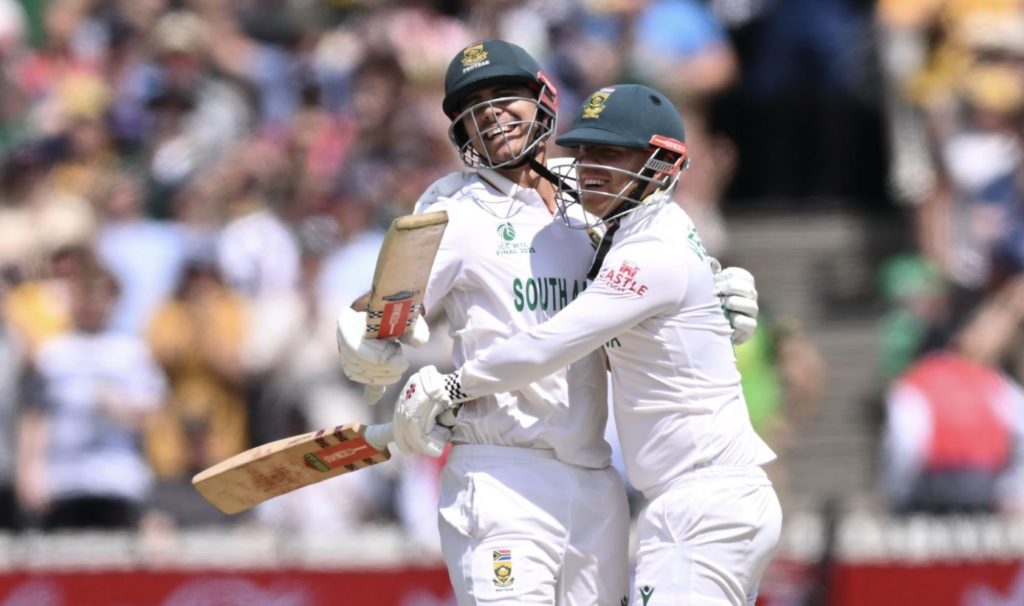The Proteas’ victory over Australia in the World Test Championship final ended decades of heartbreak, writes RYAN VREDE.
Five ODI World Cup semi-finals and two quarter-finals. One T20 World Cup final and two semi-finals. Five Champions Trophy semi-finals.
It. Is. Done. The curse is broken. Decades of heartbreak, gone. An old enemy, so vaunted and highly favoured ahead of the final, vanquished.
The Proteas are Test cricket’s world champions.
Surreal.
The proliferation of white-ball cricket has not stolen Test cricket’s identity. It may not be the most popular format globally. Still, it is the hardest to be consistently successful at, given the technical, tactical and temperamental demands it places on the combatants.
And the true beauty of the format is often found as the tactical and technical dimensions of play bow to the sheer will of individuals, pairs, and teams who collectively refuse to lose.
Make no mistake, the Proteas stared losing in the eyes. They lost their last five first-innings wickets for just 44 runs. They later had Australia staggering at 73-7, before allowing them to post 207 – a lead of 281.
They last chased more than 250 to win 17 years ago. That Test at the WACA saw Graeme Smith, Hashim Amla, AB de Villiers and JP Duminy combine to deny the Aussies what appeared to be a certain victory. It is widely considered their greatest Test victory of the modern era.
No more.
REPORT: Proteas crowned Test cricket kings
When it mattered most, Aiden Markram and Temba Bavuma’s granite minds were impenetrable and their skill soared. Markram. A century in the ultimate Test, against the ultimate Test opponent, at the ultimate Test ground.
He came into his innings on a pair. He looked lost in the first innings, shackled by self-doubt. But he found a way. You can’t quantify what it takes to get a century under those circumstances.
Innings like Markram’s are only so much about skill and technique. They are more about a man who’s been to the depths of himself and learned not only to exist but to thrive in the most testing circumstances.
Then, Bavuma. Diminutive in stature, gigantic by every other cricket metric applicable to the match situation. I’ve maligned his form across formats earlier in his career, but recently, he has found a method that works for him and against elite opposition. Hobbled by a hamstring injury that – but for the enormity of the occasion – would have forced him to retire hurt, Bavuma battled, scrapped, limped, and clawed his way forward.
Unrelenting in his application, unwavering in his desire to see his side to the Promised Land. He didn’t get a century, but his contribution should not be underestimated and never forgotten.
These Aussies were never going to succumb without an almighty fight. It is who they are as a cricket team. They’ve performed cricketing miracles for their entire existence. Indeed, the Proteas have been crushed by their ability to turn graves into gardens.
There’d be no resurrection today.
Markram and Bavuma will be a focal point, but there are others without whom there’d likely be all-too-familiar heartbreak.
Kagiso Rabada is among those. His poor decisions in his private life dominated the headlines in the build-up to the final. The scything press and social media vitriol could have – and has – derailed cricketers’ careers in the past. Not so Rabada.
He was irrepressible, taking nine wickets in the Test, the bulk of those top-order batsmen. He is unlikely to finish among the format’s leading wicket-takers by the ‘big three’ stealing Test cricket for themselves and limiting the participation of the others. But those who’ve seen him operate know that, but for the scheduling mess, KG would likely have ended his career among the format’s top 10.
Wiaan Mulder’s discipline with the ball and competency with the bat amplified the Proteas’ challenge. Lungi Ngidi’s burst in the second innings was valuable, as was Marco Jansen’s first-innings assault, and David Bedingham’s disciplined first-innings dig.
Credit must be lavished on coach Shukri Conrad and his staff. I wrote before the Test that Conrad should be given the grace to succeed or fail on his own terms. In practice, that meant owning a decision to experiment with Mulder at No 3, or include Ngidi ahead of Dane Paterson. Ultimately, he succeeded on his own terms.
Leadership matters. Conrad has succeeded where his predecessors have failed. His leadership has been described as “old-school” but that is an unsophisticated and lazy appraisal. It is undoubtedly an important dimension of his leadership style, but no coach gets their team to the WTC final, winning seven of eight series since the defeat to New Zealand in 2024, by simply relying on old-school methods. He has established himself as an elite international coach and done so with a team largely devoid of elite players.
And yet it all came together for Conrad’s Resolute Rebels. They are the world champions. The curse is broken.
History for South Africa 🤩🇿🇦
📺 Stream #WTC25 on DStv: https://t.co/rM90YyQxaw pic.twitter.com/slOs8aM6DS
— SuperSport 🏆 (@SuperSportTV) June 14, 2025
Photo: Mike Hewitt/Getty Images







